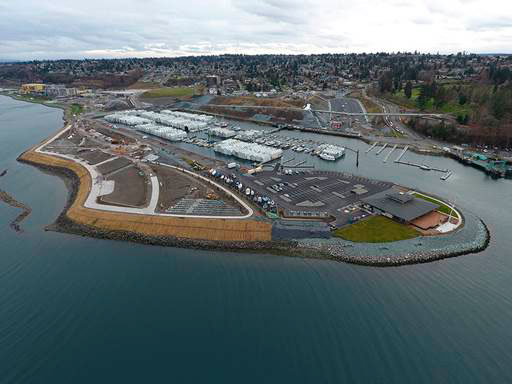Parks along the waterfront will recall the legacy of two Tacoma natives
The process of naming a new public gathering space carved from the remnants of the former ASARCO smelting operation has sparked the parallel recognition of a pioneering African-American jurist, the late U.S. District Court Judge Jack Tanner.
On Monday, Feb. 12, the Metro Parks Tacoma Board of Commissioners concluded a lengthy public process by naming the 11-acre waterfront site on the breakwater peninsula in honor of science fiction writer Frank Herbert’s 1965 novel “Dune” and its five sequels.
The board approved the name Dune Peninsula at Point Defiance Park for the highly anticipated space that’s still under construction around the Tacoma Yacht Club boat basin. In addition, a winding, paved pedestrian loop also being built on the site has been named Frank Herbert Trail. Both are tentatively scheduled to open to the public later this year.
During the same session, the board voted to rename what until then had been called Marine Park. The park, which occupies part of the Ruston Way shoreline area near Les Davis Pier, is now named Judge Jack Tanner Park. Tanner was a lifelong Tacoma resident who in 1978 became the first African-American federal district court judge in the Pacific Northwest. He passed away in 2006.
The board chose to honor Tanner as part of its commitment to social equity, inclusion and diversity, key elements of the Strategic Master Plan formally adopted by the Metro Parks board in January.
Metro Parks Commissioner Aaron Pointer, who is African-American and was a leading advocate to name a park after Tanner, called the decision a first step in correcting past inattention to the significance and contributions of residents of color.
“Names mean a lot to people,” he said. “This kind of recognition will inspire a lot of people who might otherwise feel left out. Young kids who see the sign at the park may ask who Judge Tanner was. This may inspire them to learn where hard work and perseverance can lead.”
The chosen names for the breakwater peninsula area were recommended by a Metro Parks committee of staff members who reviewed more than 500 recommendations submitted by the public last summer. Of those, about 300 were related to Herbert or “Dune.” Tanner’s name also was highly rated among the publicly submitted recommendations.
Tanner was appointed to the federal bench by President Jimmy Carter. As a judge, he was known for his often controversial decisions on behalf of African-Americans and others he believed had been the targets of inequitable treatment. In 1980, he ruled that inmates at the Washington State Penitentiary in Walla Walla had been the victims of cruel and unusual punishment, prohibited by the U.S. Constitution’s 8th Amendment. He’s also known for his 1983 “comparable worth” ruling that women should get equal pay for equal work. Although later overturned by the 9th U.S. Circuit Court of Appeals, the case remains a landmark in the history of women’s rights.
Tanner was the son of a Tacoma longshoreman and union activist. After graduating from Stadium High School and serving in a segregated U.S. Army unit in World War II, the younger Tanner also worked as a longshoreman while earning degrees at what was then the College of Puget Sound and the University of Washington School of Law. Before his appointment to the bench, he was active in the National Association for the Advancement of Colored People and he marched for civil rights in Mississippi. As a lawyer, he regularly represented Puyallup, Nisqually and other Native American rights activists in disputes over fishing and treaty rights.
“Dune,” one of the best-selling science fiction works of all time, was the first such novel with an environmental theme. And according to Herbert’s son, Brian, who wrote a biography of his father, Frank Herbert’s devotion to the natural world evolved from his Tacoma childhood and his recollection of the foul smoke that spewed from the stack of the former ASARCO smelter.


For about 100 years, the smelter complex dominated the waterfront adjacent to the breakwater, itself built from smelter slag, the waste residue of copper production.
“Frank Herbert won the most prestigious awards in science fiction. Geographic features on Saturn’s moon Titan are named after words coined by him. And yet, not many people know he’s a native of Tacoma,” said Commissioner Erik Hanberg, an author who championed the cause. “His experiences in Tacoma shaped his appreciation for the delicate balance of nature, so it feels right to attach his name to a park that reclaims toxic land.”
When Dune Peninsula at Point Defiance Park opens, it will feature panoramic views of Commencement Bay, Vashon Island, downtown Tacoma and Mount Rainier. A pedestrian-bicycle trail will connect it to the rest of Point Defiance Park, just west of the peninsula.
The development is part of Metro Parks Tacoma’s Waterfront Phase 1, a huge restoration and redevelopment project that is central to Destination Point Defiance. This initiative, funded largely through a $198 million bond issue approved by Metro Parks voters in 2014, is designed to enhance the experiences of visitors to Point Defiance Park and honor its character.
– Metro Parks








